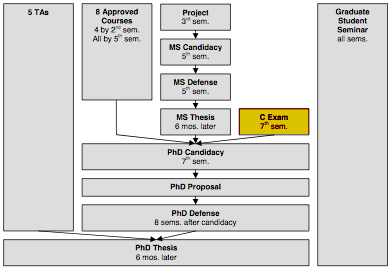Examined.

Hi. I don’t know if you remember me—I blog here occasionally.
November was particularly bad: two posts were all I had time or inclination to write. It had a little to do with big conference paper deadline, but can be chiefly attributed to the “C??? Exam.
C EXAM – Deadline: 7th semester
You must pass a private oral examination in your area of research. Each area has a formal or informal syllabus listing topics and material covered. The exam normally takes 1.5 to 2 hours. It covers both basic material, such as that from a 400-level course, and more advanced material, such a solving a problem in current research.
Your discipline/department/sorority/paramilitary outfit might refer to this cherished tradition of institutionalized hazing as quals or comps (although I suppose comps are typically written, and “quals??? can sometimes refer to preliminary breadth exams).
The moniker is peculiar to Rice CS; as I understand it, the “C??? is a vestige of an earlier 3-exam sequence, including “A??? and “B.??? (The “B??? exams, mnemonically enough, were breadth exams; I have no idea what the “A??? covered.) The other two exams were phased out in the 80s and 90s, as they were largely redundant with classwork and were found by grad students and advisers alike to be generally annoying. (Oh, maybe that’s what the “A??? stood for.)
Like any sufficiently diagnostic test, the qualifying exam is intended to be difficult. What makes it special, however, is that it is also intended to be unpleasant. It has been said (by my adviser, no less) that the exam doesn’t even really begin until the questioning careens into material that you are uncomfortable with. To get an idea of why this is bound to happen, let’s take a look at the entire range of topics that are fair game on your quals:

Now consider the fact that you (most likely) have a finite amount of time to prepare, and a similarly finite capacity for retaining information thus acquired. The winning strategy is to spread your studying across the entire spectrum of topics, lingering on things you’re not really familiar with (say, topics from the operating systems course you took ten years ago) to ensure even topic coverage. The histogram of your exam preparation will probably look something like the following:

Now let’s overlay the final curve: the topics actually discussed during oral questioning by your exam committee, who are free to choose areas in which they are particularly knowledgeable (or have recently researched):

Each question is likely to begin in shallow areas in which the examinee has some comfort. But, unlike a static question on a written test, the oral exam rewards a correct answer with a harder question. With no way to anticipate the course of questioning, eventually every hopeful PhD candidate will end up in deep water.
In the end, I passed. My committee scolded me for not having deeper knowledge, but were pleased that I was able to reconstruct from first principles the things I ought to have known. (Computer scientists will note this as a classic time/space trade-off: when one resource is tight, compensate with the other.)
Now that I’m out from under this rock I have plenty to catch up on, including some research, a couple of personal software projects, and a handful of queued blog entries. In the interest of public service, I’ll close with a bit of advice for students preparing for quals. It is twofold:
- You cannot possibly hope to study sufficiently for your quals.
- But, by all means, try.
